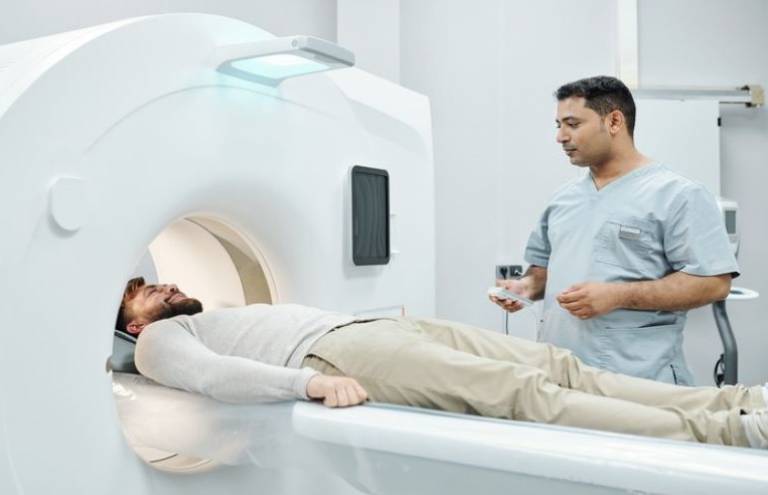Catching and treating more prostate cancers worldwide
Thanks to UCL research, millions of men each year benefit from more accurate diagnosis and treatment of prostate cancer with significantly fewer side-effects.

28 April 2022
For the past 50 years, men at risk of prostate cancer have been assessed using a blood test for prostate specific antigen (PSA), followed by biopsy if PSA levels are high. To obtain the sample a needle is inserted into the prostate via the rectum, which is inaccurate, painful and can cause bleeding and sepsis.
Doubling detection rates
Professor Mark Emberton is Dean of UCL's Faculty of Medical Sciences and Honorary Consultant Urologist at University College Hospitals NHS Foundation Trust (UCLH). His team at UCL/UCLH pioneered a new diagnostic pathway that includes an MRI scan to detect prostate cancers. This led to two pivotal trials which tested the effectiveness of MRI scanning and demonstrated the procedure could identify tumours without the need for invasive, risky and sometimes unnecessary biopsies. The trials provided sufficient evidence to change clinical practice; NICE have recommended imaging in the form of MRI be offered to all patients undergoing prostate biopsy.
If a biopsy is needed, the team have developed a technology to make the procedure more precise, requiring fewer needles and improving cancer detection by nearly double. During the biopsy procedure, ultrasound is used to find the prostate, but ultrasound cannot see tumours. The UCLH system, SmartTarget, overlays tumour information from MRI scans onto ultrasound images. The chance of side-effects such as blood in urine, semen or faeces are reduced by half. Pain and risk of sexual dysfunction are reduced. SmartTarget has been used to treat over 500 men in clinical trials in the UK and US and is being rolled out in Spain, Ireland and the US.
Towards more targeted treatment
World-wide adoption is benefitting five million men every year by avoiding unnecessary biopsies and providing cheaper, less harmful, and more accurate biopsies with fewer cancers missed. NHS savings alone are approximately £113 million per year. MRI scanning means surgery can be targeted to the tumour itself and a wide margin around it, preserving more of the prostate. Radiotherapy can be targeted more effectively to avoid harm to normal tissue. Biopsy numbers have been reduced by a quarter, allowing over one million men every year to avoid unnecessary procedures.
Research synopsis
Transforming the diagnostic pathway for men at risk of prostate cancer with magnetic resonance imaging (MRI)
UCL research has transformed the way prostate cancer is both diagnosed and treated. Millions of men every year now benefit from more accurate diagnoses and novel treatments that cause significantly fewer side-effects.
Links
- Professor Mark Emberton’s academic profile
- UCL Faculty of Medical Sciences
- UCL Medical Sciences REF 2021
Image
- Image credit: iStock
 Close
Close

